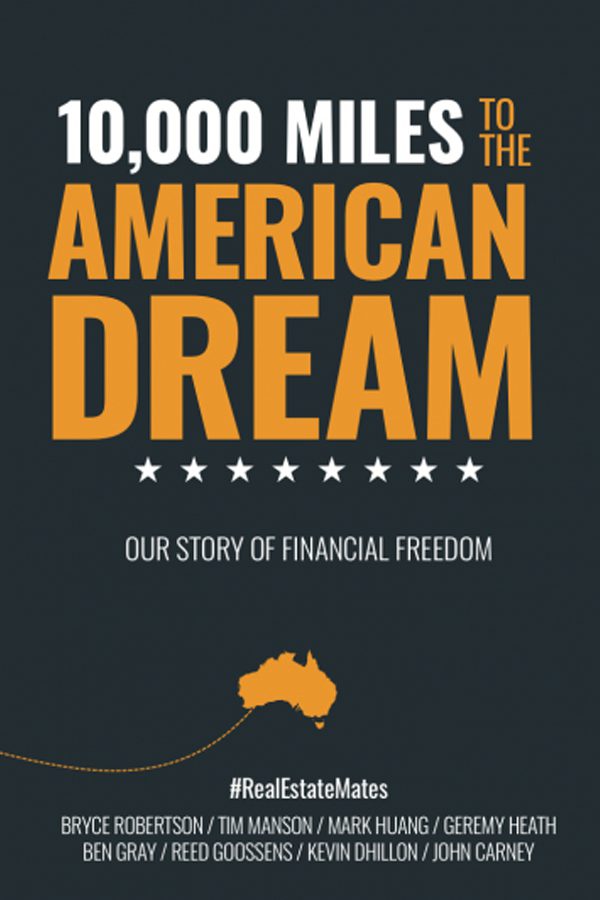0

Your dream of financial freedom is attainable with the right strategy. In this episode, Reed Goossens, real estate investor, joins Moneeka Sawyer to share his journey moving across the globe from Australia to the United States with limited funds and how he found success and financial freedom. Reed talks about building a holistic long-term business by creating an ecosystem to recession-proof his business. By having diversified multiple streams of income, Reed dives into how you can create your own ecosystem that’s more stable in the long-term on your way to wealth generation and financial freedom.
—
Listen to the podcast here
How An Aussie Can Move Half Way Across The Globe With Limited Funds with Reed Goossens
Have you been interested in investing in real estate, but nothing you’ve looked at so far looks blissful? If so, I totally understand. That’s why I’d like to introduce you to Maureen McCann at Spartan Invest. At Spartan Invest, they strive to identify real estate assets which will offer viable investment options with exceptional rates of return. They do the work for you. They locate, purchase and rehab the property, then find and manage the tenants. You simply invest in a turnkey property and monitor your investments from the comfort of your own home. What could be more blissful than that? If you would like to find out more, go to www.SpartanInvest.com/Investing4Women, or email Maureen directly at [email protected]. Let her know I sent you.
—
I am delighted to welcome to the show, Reed Goossens. Reed is a real estate investor, bestselling author, entrepreneur, podcast host and an all-around good bloke. I love the way he says that. In 2012, Reed quit his job in Australia and moved halfway across the globe to the United States to change his life and to chase a dream. With limited funds, no investing experience and no credit, Reed went from purchasing a small duplex to growing his own real estate investment firm. Reed syndicates large multimillion-dollar deals across the United States. He has also achieved financial freedom and has taken control of his life. If we can move halfway across the world and achieve this success, so can you.
One of the things I want to tell you, ladies, about Reed. I was on his show. I’ve been on a lot of shows and this was probably the best show I have ever been on. Reed is heart-centered in spite of his success. I know many people come on here and want to talk about how amazing they are, but I’m not sure whether it’s in spite of or because of his success. He is so heart-centered. That interview warmed my heart. I was tingling for days remembering the conversation and what I learned from it. I’m delighted to share him with you. Reed, thank you so much for blessing our show by joining us.
That’s a very awesome introduction. Thank you.
Welcome to the show. Could you tell us a little bit about your story, like the two-minute version?
You pretty much summed it up. I moved here in 2012 to chase two loves of my life. One was the love to live in New York City, to be an ex-pat. My background is instructional engineering. The other love was for a girl who is now my wife, Erica. We live in sunny, California. We were in New York for a couple of years and then moved out here. When I first moved out here, it was more to do with the fact that I wanted to live in the United States for a period of time and not have the fear of regret when I’m 60 or 70 years of age. Fast forward many years later, so much stuff has happened and it’s been an incredible journey and I loved every single minute of it. I know the next decade is going to be even better. That’s the two-minute pitch in terms of the coming to America story, wanting to chase a dream, wanting to scratch an itch and opening doors and walking through those doors and throwing away worrying about ten years later what’s going to happen. Enjoy the now, the moment, being in the present.
Where in California are you?
We are in Los Angeles. We are near Culver City if you know where that is.
Reed, I know that you talk about creating a holistic long-term business, which is what I’m all about also. Could you talk to me about creating what you call an ecosystem to recession-proof your business?
When you start scratching this itch of how to create financial freedom for yourself, you increase your financial IQ. I’m very much a math nerd being an engineer. I love numbers. When I got into real estate, it is a vehicle to achieve financial freedom. To have a legacy wealth and long-term freedom of having time on your hands, it’s the other ancillary business that you can create from the one vehicle that will feed one another that will ultimately create this system. You could remove yourself from it and continue going without you being in it. What am I talking about? We talk about funnels and there’s the marketing side of it.
I do my own podcast. I have my income streams from the marketing side piece of it. There’s obviously the deal of the acquisition side, which is important. It’s a very massive pillar that supports the foundation, but it’s one pillar. From there, there are other businesses that we can create. In my business, we don’t do it now, but you could do property management, you could bring that in house and you could create fees and income from that. You can also create construction management, which is something we do in house for our deals. We’re not outsourcing it to a third party and giving someone else the profits, but bringing the profits in house and making it more sustainable.
Through doing that, you create this system of one feeds the other and that keeps the profits in house. It creates better returns for our investors. It also helps when you may not be acquiring assets, you still have other income streams coming in through the management of the portfolio that may be in the past, you’ve given it away to a third-party company. Instead, you now brought it in house and creating that ecosystem. For me, long-term wealth is created through creating ecosystems. That’s just one example. There are many different examples of what an ecosystem can look like within any business. It’s understanding the stuff that you may do on a daily basis that you may pay for that you could potentially bring in house over the long-term.
It’s interesting because we hear over and over again that the rich have seven streams of income. A lot of times what people think is that seven different businesses, “I’m going to do this MLM and I’m going to do this job and then I’m going to do this.” What is the mistake in that is that you end up being spread thin between all of those different avenues of creating a stream of income. The rich don’t do it that way. They are not plugged in to every single one of those pieces. What they do is they create passive income and other income streams that are related to their main business or main genre. For instance, our genre is real estate. What you talked about is multiple streams of income within the umbrella of real estate. When we’re creating multiple streams of income, like you say, if you’ve got one that’s not performing but another one is, your business is still fine or another five are. It gives you an opportunity to be successful in different kinds of markets.
Different kinds of markets, but also different kinds of volatility in the markets. When one market may be going better or now in COVID, acquisitions have gone completely to a grinding halt. Having other ancillary fees coming in like asset management fees or construction management fees or property management fees that can keep the business supported and keep the lights on, it’s important to creating that ecosystem that we spoke about, those multiple streams of income.
Could you talk a little bit about if you’re a professional working full-time, how this might fit into your ecosystem investing in real estate?
If you like what you do, and some people do, they don’t want to quit their job and they only want to be passive. That’s the beauty of real estate investing, particularly in the syndication’s world, which is what I am in. I’m in the multifamily, but you could have an ecosystem of diversification. Meaning that you could have your passive dollars invested in different asset classes. There could be some multifamily, it might be some single-family investments. There might be some mobile home parks or some warehouse, some self-storage or some office space. All of that can help you be diversified and have those multiple streams of income. When one asset class is sucking wind like retail right now, you might be more heavily reliant on multifamily or more heavily rely on a warehouse, whatever that might be.
That helps you create the multiple streams of income, which makes your little ecosystem as a passive investor more stable in the long-term. That’s why I think from the passive side is powerful about the vehicles that are now accessible to the average investor. Maybe several years ago, these vehicles went away and weren’t available. The way in which we’ve evolved over time, with the way we’ve invested in people not wanting to invest in the historical traditional ways of investing in the stock market and going investing in hard assets with different operators has become more plentiful in the last 5 to 10 years. That has opened up a Pandora’s box of opportunities for investors to go out and we’re like a kid at a candy store.
I want to give a little bit of clarity on what Reed is talking about here. It’s to invest in other operators. This isn’t you go out and invest in a single or in a multifamily, a mobile home park, a warehouse or whatever. This is finding other operators that you trust that are paying you. Everybody has a different schedule. Some of them will pay interest. Some of them will pay interest plus equity. There are different formulas and you want to find an operator that you trust and then take a look at their formula and see if both of those things work for you. If you’ve got the cash, then you can turn it over and make quite a nice return. It’s easier to diversify that way.

10,000 Miles to the American Dream: Our Story of Financial Freedom
Reed, tell me if this analogy works for you or if you’ve got a better one. It is like investing in the stock market where you’re investing in a company that has a series of assets that then will pay you on. The big difference here is that we have hard assets as opposed to paper assets that we have no control over. When you’re investing in a syndication, some have a level of where you can vote or make an impact. The other thing is they are usually smaller operators that do feel very committed to communicate with you. That is different than a lot of the bigger companies that you can get stuck on there. They say they’re committed to their shareholders, but that looks a little bit different to us than we might hope for. You do get a lot more control as a hard asset in a syndicator that is going to be paying you.
That’s where the transparency comes in. You have the element of the hard asset for the depreciation benefits. Also seeing that you’re investing in ABC Smith Street. It’s not just throwing your money into the stock market and hoping that it’s going to do well for you. It’s a physical asset and you can see it. To your point, it’s usually smaller operators like myself who will communicate directly with the investors that can see what’s happening. They can walk the property if they want. We encourage investors to go walk. They’d probably keep an eye on the onsite team, make sure they’re doing their job. That’s your money in that deal. There are a lot of benefits of investing in smaller operators, in physical assets, in syndication that you don’t have to be the expert going out and finding these deals. You can be more of what’s called an armchair investor, passive investor and go along for the ride.
Where do you do most of your syndications?
We do most of them in Austin and San Antonio in Central Texas.
We’ve had several people on the show from different areas. I like people to see that if you like the Texas market, you might call Reed. If you like a different market, you might call one of the other people that have been on the show. That’s a great resource. Thank you for that. Could you talk to me about re-entitling land? This is my personal strategy, so I want someone else to talk about it so I can learn.
You look at it like flipping paper, but to boil it down to its nuts and bolts is highest and best use. What is the highest and best use for a piece of land? I’ll give you an example. You might have a single-family house on a larger lot that you could simply split into two lots and you can sell one of the lots and make a profit. That is a highest and best use because it zoned for two lots. Back in the day, back in the early 1900s or wherever it was when the house was built and zoning laws have changed a ton with density increasing and housing crisis, particularly in places like LA and up in the Bay Area where you are. Zoning always evolves over time.
You can find these gems where you can split the block. You could find with a single-family, but maybe you could build a fourplex on it. It’s a highest and best use. Here’s the rub. You don’t have to go and do the construction. You could go in and get the physical paper or the plans approved for a second edition, or a full unit. You can sell that paper to a developer who wants to build it. There’s profit in that. You can’t go to a broker and be like, “Tell me what all those pieces of paper we’re selling for to those developers.” There’s no actual MLS for that, but you can go and create value out of literally the house that you own, going to the city and saying, “I want to build a granny flat on the back. I know by looking at the zoning laws, I could potentially build a fourplex.” Maybe that’s your exit strategy.
You’ve created value for someone because also you’ve taken risks off the table. If you’ve gone to the city and spent time negotiating with the city and going through planning approval and they get comfortable like, “This is a good idea. Let’s put four units on it.” You can package it up. You can say, “Here, developer, go nuts. Here’s my piece of land. Here’s a single-family house on it. You could build four units on it. You take all the construction risk. I’m going to walk down the road with my profits and go do something else.”
You can find those in the MLS. It will often say, “House for sale, great contractor, special plans already approved by the city.” We will look at those properties myself because every once in a while, I might want to pick something up like that. Everything has gone through the city. I’m not dealing with that piece of the paperwork.
It’s very bureaucratic. In saying that, once you do get to know the planners and your local municipality, it’s not as hard as people think. It’s a people’s game. You’ve got to make sure you’re on it. Person A is talking to Person B and the right hand is talking to the left hand.
This is my thing. I talk about how to go in and take a look at a property. I’m calling it an underdeveloped property. It’s a property that has something on it, but it has so much more potential. I don’t have very many people that come on the show that talk about that. What I love is your strategy about the value add. You buy the land and then the value add is you go through all the bureaucracy. You upsell it. It’s almost like a wholesale deal, but it takes a little longer.
The people who are out there reading are thinking, “How do I even get started?” There are many municipalities around the country that are very gray. Compared to my home country of Australia, they have incredible systems online that you can go see what the zoning is. What I’m encouraging people to do is educate yourself in your local municipality about what are the zoning laws? Here in LA, there’s R and there’s C. R stands for Residential, C stands for Commercial. There’s more but I’m not going to get any more complicated than that. It starts with R1. That is like a single-family block, you can only build one on it. There’s R2, there are R3 and R4. As you go down the line, what happens is the zoning laws then tell you in plain English, you can have the smallest amount of habitable space, meaning it might be for example an R4 lot.
You can have an R4 lot and the smallest dwelling size on it can be a 450 square feet unit. If you’ve got that in the back of your mind, “I’ve got 10,000 square feet here. I can maybe split this block up into X amount of units.” There are setback issues on the front and the back, and I’m not trying to get too complicated. What I’m getting at is that there is a lot of information readily available at your fingertips. You can find out exactly what zoning you’re sitting on right now, what block you’re looking at to see what’s the highest and best use. An R2 lot is a great example. My wife and I bought an R2. It’s a single-family house, but it’s on an R2 lot, which is a 5,500 square feet lot that I can put another dwelling on the back.
I’m not trying to change the zoning. It’s the highest and best use. It wasn’t built to the highest and best use back in the day. That’s the easiest way to get approved because the city can’t stop you if it is the highest and best use. For example, it’s an R2 lot. You can build two dwellings on it. You’ve only got one. You’re not changing anything. You’re literally going through the process, from A to Z, stock standard stuff to get it approved. It’s not like zoning changes where you need to go in and some developers do that. It’s something that you need to be very educated on to do, but that takes years.
Where something that is buy right, that’s the thing you need to need to understand, “I can buy right to build two dwellings on this block or I can buy right to build four dwellings on this block and it’s only got one.” Know that in the back of your mind that you can find that information online. When you go to the city, they’re not going to put up these red flags. “This is my right to build. I own this land. I can build four units on it and you need to approve plans for me.” You go down that path with the city and it takes a period of time. It won’t happen overnight. Once you do get it, there’s value in that. That value you can sell to some other person or you can build it yourself if you want.
There’s also value in building that relationship with the city like you said. There are a couple of things I want to add here. He talked about rezoning. Also, don’t ask for variances because again variances will slow things down quite a bit. Variance is a fancy word for exceptions. I want to do something a little bit different. It’s only this little thing. If it’s such a little thing, don’t ask for it because it will slow things down quite a lot. The other thing is to take the time to get to know the planners and the engineers in the planning departments of your city, especially when you’re starting. Even though everything is laid out online and with the zoning, you’ll have things come up. One of my favorite questions with my different planners that I go and see in the different cities is, “Is there something I should be asking you that I don’t know to ask?”
For instance, I’ve got a project that I’m interested in Campbell and they’ve got all the electric wires above ground, but they’re trying to change in that particular area to have everything underground. Every single developer that comes in that gets new permits has to go underground. There’s no way we could have known that by looking at it online, but I knew it because I went in and they know me. Everybody in the office was like, “Moneeka, you should be paying attention to this. Moneeka, this is probably going to cost you about another $100,000 on that project.” I was like, “At least now I know what my hard costs are, what my soft costs are and what this is going to take to make it happen.” As you start to open up that conversation and you’re a likable person and they want to help you out, you start to have these conversations where you get so much more information about what’s possible.
I don’t know what it’s called up in the Bay Area, but at least here in LA, it’s called a Q condition. It’s a Q overlay. You might view it online. It’s an R2. This is what it is. When you go into the actual city, there might be what’s called a Q overlay where they may have added something that the website hasn’t picked up yet because it hasn’t kept up in real-time. A bill modeling passed down by the local council to say, “We want all power lines now to go underground.” That might not be online yet because it was only past 6 or 7 months ago. Keeping those relationships up is important.

Moving Across The Globe: When you start scratching this itch of how to create financial freedom for yourself, you increase your financial IQ.
The one thing I’ll also add is how blown away I was when I first moved to this country that pre-COVID, you could walk into most cities and have a chat with someone who is in the city planning department, and they’re willing to do it. You’re taking a ticket at a meat sale line and I call your name out and you go up and say, “I’m looking at this particular piece of land. Is there anything else in this state or county in its Q conditions? Are there any other Q conditions I need to be made aware of to see if I’m doing my due diligence?” You can do that before you even bought the property. In Australia, you can’t do that. The system isn’t set up like that. Realize that the access to information here is so much greater than when you’re trying to develop in other countries, even like in my home country of Australia.
Originally when I started doing this, I was like, “I haven’t made an offer. I don’t know if I’m going to buy this place.” I felt a little bit bad about taking their time, but no, they love it. They love chatting. It’s like a puzzle for them. They’re like, “Yes, we could do this. We could do that.”
The other thing I’ll quickly add in there is for us, we bought this house. It was 1912. They don’t have any plans on record of what the house looks like. They have some very loose papers that it’s a 3-bedroom, 1-bath, but they don’t have physical plans of it. When you’re going in to do these improvements, they love the fact that you’re bringing plans to the city and that goes on file for the next 100 years or whatever it is. The city is incentivized to make sure they’re collecting as much data as they can. When you’re in there, even when you’re prospecting, they’re interested to know what you might want to do with it because that might give them ideas for their planning or urban development committees in their file.
They aren’t having conversations for no reason. They’re having a conversation listening and taking them back to their superiors and giving feedback, “We had someone come in today. They’re looking at doing X, Y, Z. What do you think of that? Does that go with the plans that the mayor wants to do for the downtown urban center or whatever it might be?” Most cities will have that. I bring up another point. Different cities called different things. I know in like the city of Long Beach, they call it the downtown urban development plan. It’s a book. It’s 100 pages of this outline of what they want to invest in the city over the next 20, 25 years. They have different areas they want to inject money into. They want to have certain sidewalk improvements. They want to have more shops and mixed-use areas. You can read that and see if it aligns with what their downtown plan might want to be and look like in the future. Get your hands on that. It’s great nighttime reading if you’re interested.
It’s also impressive because one of the reasons why I get things through is because people know that I’m interested in the community. I’m not some developer coming in and saying, “I want to make $2 billion.” I care about the community, what’s going up, what’s their plan, how to make something beautiful and how to up-level the community in different ways. I’ll often go into what we call redevelopment areas. If you’ve done that reading or at least scanned it, they’re like, “This particular developer is interested in us and our plan and what we think, not just in themselves.” That makes a huge impact on them.
You’re doing a great job. It sounds incredible. I want to come and join you one day.
I would love that, Reed. Let’s do it. I can do something down there with you. That would be fun. We are going to have more of Reed in EXTRA where we’re going to be talking about what he calls his six Ps, which is all about what successful people do to up-level their relationships to increase their business. I’m excited to talk about that in EXTRA. Reed, could you tell everybody how they can get in touch with you?
The simplest and easiest way is to go to ReedGoossens.com. If you go there, you can find my podcast. You can find books. If you are ever coming through LA and you to hit me up, you can send me an email at [email protected]. Give me a little bit of heads up and we can go out for lunch, coffee or whatever you want. We can talk shop. For those readers, if you are interested, I have a book out and I’ve got a lot of them sitting in my office at home and my wife is nagging me to get rid of them. If you want a free copy of my book called 10,000 Miles to the American Dream: Our Story of Financial Freedom, email me at and I will shoot you a free copy. Just say you read the show and I will shoot you a free copy.
Could you tell everybody what your amazing podcast name is?
It is called Investing in the US. It is a collection of conversations of people coming and creating something from nothing in and around obviously real estate, but overdoing it. We talk a lot more about the journey and creating something from nothing. Check it out.
I was fortunate enough to be invited to be on that show. Go check it out. It’s good. Reed, are you ready for our three rapid-fire questions?
Let’s do it.
Give us one super tip in getting started investing in real estate.
A quote that my dad always said, and I use this all the time, “A fool and their money are easily parted.” Don’t be a fool when it comes to your money and be educated. Start with education. I’m self-educated. I didn’t go to school for real estate development. I went to school for engineering, and I’m all self-taught about how this business and how to go out and be successful. The same can apply to the readers.
What is one strategy on being successful in real estate investing?
Getting started. Everyone asks me, “What’s the best deal you’ve ever done?” I said, “It’s the first one,” because you don’t get to deal number ten without doing deal number one. Getting off the fence, there comes a point in the education piece at the start, and then you get to analysis paralysis where you start spinning your wheels, and then you need to go take action. I vividly remember reading books on the subway in New York City and thinking, “I need to get going. I need to go do my own deals because reading a book isn’t going to do anything for me.” It’s like reading about losing weight. You’ve got to stop reading that and go open the door and go to the gym. It’s the same thing. Take action. Educate yourself first and then go and take some action, and massive amounts of it because it’s going to be needed to get you to that first deal.
The other thing is don’t feel like you need to be so educated that you know everything. Going to the gym, it takes time to build those muscles and you’re going to learn different skills and increase your capacity. All of those things change, but you have to start somewhere. Get enough education to get started and then take action. What would you say is one daily practice that you do that contributes to your personal success?
It was changed over the years. As I become more self-aware of my subconscious, and it sounds like you talk a lot about on this show, which I’m very much a huge believer of. I have changed my mindset around some things that I’ve had hang-ups in the past. Meditation is a big one for me in the morning. Taking some time in the morning to sit with my thoughts before jumping into the day. I’m very much guilty of trying to turn the phone on too quickly or jump into emails and having that quiet time, being prepared, being self-aware, centering yourself, and then not going often in tackling the day. When I don’t do my breathing exercises in the morning, it throws the whole day off. That’s a massive spanner in the works. I don’t feel as productive as what I usually do.

Moving Across The Globe: Don’t be a fool when it comes to your money. Be educated.
Probably that and exercising are the two big things. A lot of people say that a level of mindfulness. It’s counterintuitive. People are like, “I don’t have the time for that. I’m busy. I’ve got a lot to do.” The problem is that if you don’t do it, you need a lot more time to do the things that you need to do. If you do get centered, you do meditate, you do take some time to be very introspective, you are so much more productive during the day.
You stop that chatter of, “I’ve got too much to do,” because all of a sudden, you find time to do those important things, which is working on yourself first and foremost before you can help others.
Reed, thank you so much for all you’ve offered in this portion of the show. I can’t wait until the next portion.
Thank you so much for having me. I hope everyone has learnt a little bit and remember to reach out if you’re ever in LA.
If you are subscribed to EXTRA, we have some awesome stuff. We’re going to be talking about Reed’s six Ps, which will help you to create the relationships that will build your business. I’m excited to learn all about those. If you’re not subscribed to EXTRA but would like to be, go to RealEstateInvestingForWomenExtra.com. You get the first seven days for free, so you can check things out. See if it’s like up your alley. You can binge on a bunch of stuff. The other cool thing is that EXTRA comes down on whatever device or app you’re using. You don’t have to have new technology around that. That’s cool too. Go check it out. If you’re leaving us now, thank you so much for joining us for this portion of the show. You know how much I appreciate you. I look forward to seeing you next time. Until then, remember, goals without action are dreams. Get out there, take action and create the life your heart deeply desires. I’ll see you soon. Bye.
Important Links
Love the show? Subscribe, rate, review, and share!
Join the Real Estate Investing for Women Community today:

Moneeka Sawyer is often described as one of the most blissful people you will ever meet. She has been investing in Real Estate for over 20 years, so has been through all the different cycles of the market. Still, she has turned $10,000 into over $5,000,000, working only 5-10 hours per MONTH with very little stress.
While building her multi-million dollar business, she has traveled to over 55 countries, dances every single day, supports causes that are important to her, and spends lots of time with her husband of over 20 years.
She is the international best-selling author of the multiple award-winning books “Choose Bliss: The Power and Practice of Joy and Contentment” and “Real Estate Investing for Women: Expert Conversations to Increase Wealth and Happiness the Blissful Way.”
Moneeka has been featured on stages including Carnegie Hall and Nasdaq, radio, podcasts such as Achieve Your Goals with Hal Elrod, and TV stations including ABC, CBS, FOX, and the CW, impacting over 150 million people.






